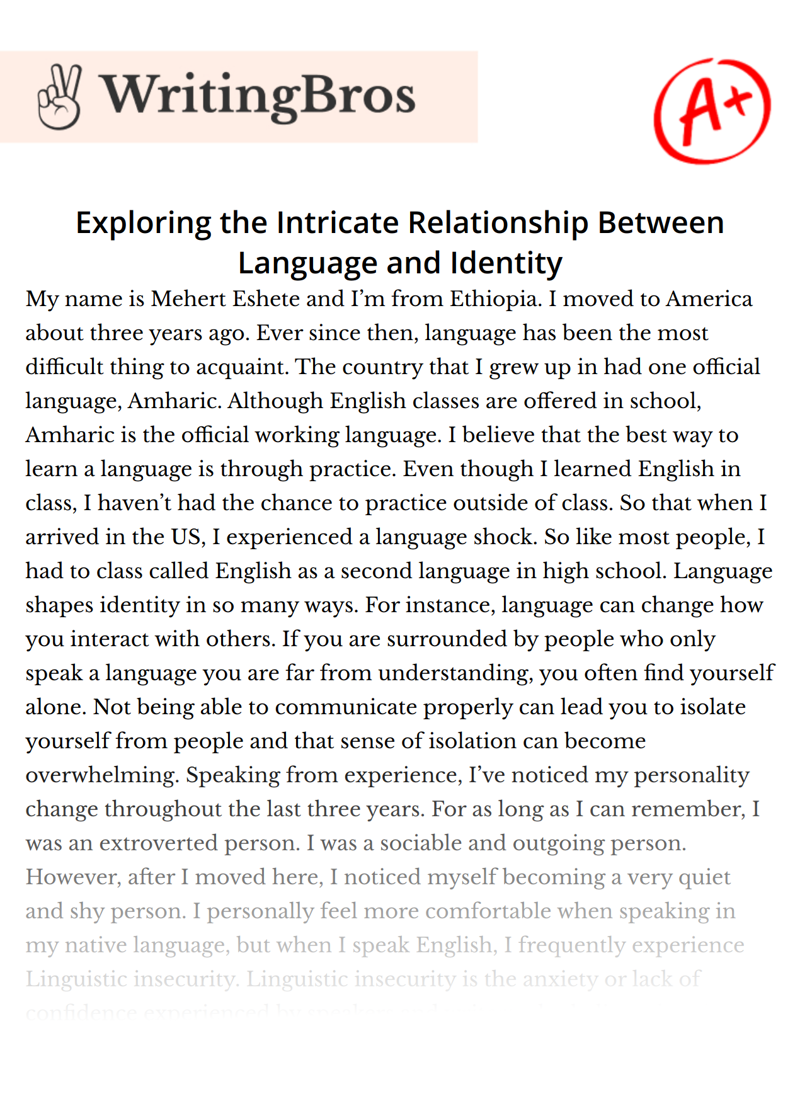Exploring the Intricate Relationship Between Language and Identity

My name is Mehert Eshete and I’m from Ethiopia. I moved to America about three years ago. Ever since then, language has been the most difficult thing to acquaint. The country that I grew up in had one official language, Amharic. Although English classes are offered in school, Amharic is the official working language. I believe that the best way to learn a language is through practice. Even though I learned English in class, I haven’t had the chance to practice outside of class. So that when I arrived in the US, I experienced a language shock. So like most people, I had to class called English as a second language in high school.
Language shapes identity in so many ways. For instance, language can change how you interact with others. If you are surrounded by people who only speak a language you are far from understanding, you often find yourself alone. Not being able to communicate properly can lead you to isolate yourself from people and that sense of isolation can become overwhelming. Speaking from experience, I’ve noticed my personality change throughout the last three years. For as long as I can remember, I was an extroverted person.
I was a sociable and outgoing person. However, after I moved here, I noticed myself becoming a very quiet and shy person. I personally feel more comfortable when speaking in my native language, but when I speak English, I frequently experience Linguistic insecurity. Linguistic insecurity is the anxiety or lack of confidence experienced by speakers and writers who believe that their use of language does not conform to the principles and practices of standard English.
According to Role Of Language In Identity Formation Cultural Studies Essay “People that have multilingual backgrounds face complex issues in adapting and assimilating their language to cultural identity that they want to be identified with. People create their linguistic structure so as to bear a resemblance to those of the group with which from time to time they wish to identify.”
We as humans often change ourselves when we speak to certain people, interact with different groups, etc. This is the same when talking in another language. As stated in the article Should Writers Use They Own English? by Vershawn Ashanti Young, “Code meshing is the new code-switching; it’s multi dialectal and plurilingualism in one speech act, in one paper. Let me drop some code meshing knowledge on y’all. Code meshing what we all do whenever we communicate—writin, speakin, whateva. Code meshing blend dialects, international languages, local idioms, chat-room lingo, and the rhetorical styles of various ethnic and cultural groups in both formal and informal speech acts.” (Young). From my point of view, I often find myself speaking in both English and Amharic languages interchangeably.
Code-Switching is a practice of two languages and dialects co-existing in one speech act. Code creates and reflects your identity. It reflects your environment, your surroundings, and where you come from. We all do it to some extent, mixing in dialects or adapting your way of speaking to suit our audience. For instance, the way we speak to our friends is not the same as how we speak to parents or instructors. The language teenagers use when speaking to their friends is not the same language they use to speak to their grandparents.
Cite this Essay
To export a reference to this article please select a referencing style below

